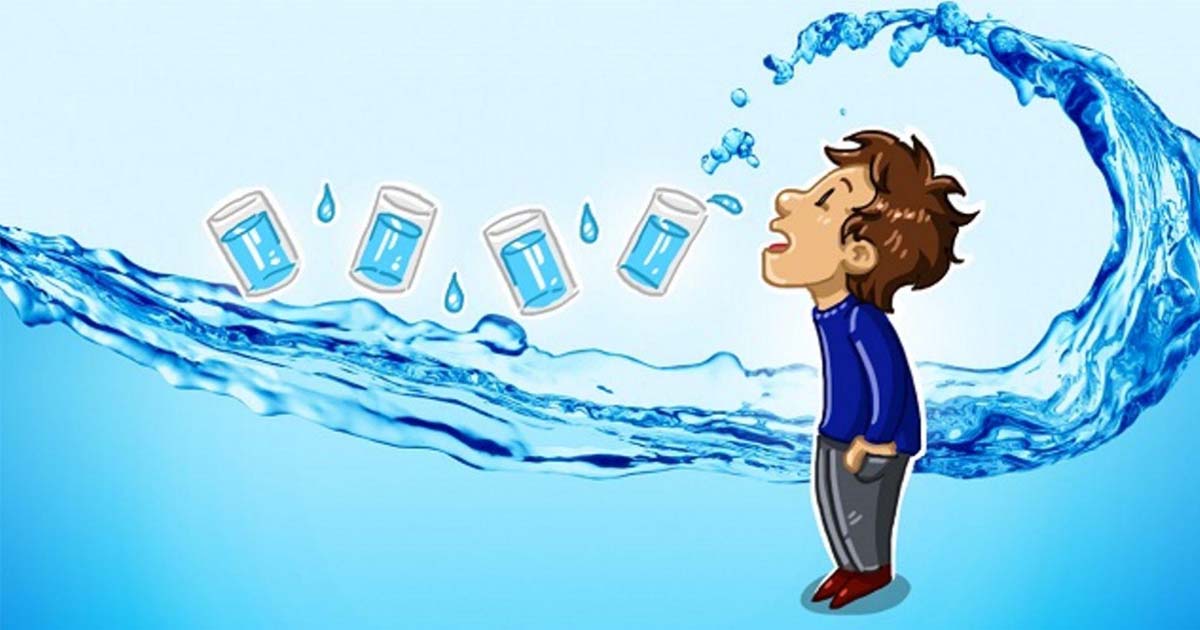News Desk |
Our body weight is approximately 60 percent water and uses it in all its cells, organs, and tissues to help regulate its temperature and maintain other bodily functions. All the cells and organs in your body need water to function properly. However, excessive water consumption can lead to water intoxication. This has been known to be fatal in some cases.
Water intoxication
Also known as water poisoning, water intoxication is the disruption of brain function due to drinking too much water. Drinking a lot of water increases the amount of water in your blood. This water can dilute the electrolytes in your blood, especially sodium.
Sodium helps balance fluids between the inside and outside of cells. When sodium levels drop due to excess water consumption, fluids shifts from the outside to the inside of cells, causing them to swell. When this happens to brain cells, it can produce dangerous and potentially life-threatening effects.
Read more: How bad are processed foods for health?
Bottom line: Water intoxication results from drinking too much water. The excess water dilutes blood sodium levels and causes fluids to move inside cells, which then swell.
‘Water Intoxication Is Very Real’: Mom Shares Warning After Daughter’s Scary Reaction https://t.co/6vmaAdMYOr pic.twitter.com/lDG8Mxz380
— The Bump (@thebump) July 29, 2019
Dangers of too much water
Water intoxication results from the swelling of cells. When brain cells swell, pressure inside the skull increases. This pressure causes the first symptoms of water intoxication, which include:
- Headache
- Nausea
- Vomiting
Severe cases can produce more serious symptoms, such as
- Increased blood pressure
- Confusion
- Double vision
- Drowsiness
- Difficulty breathing
- Muscle weakness and cramping
- Inability to identify sensory information
Excess fluid accumulation in the brain is called cerebral edema, which can affect the brain stem and cause central nervous system dysfunction. In severe cases, water intoxication can cause seizures, brain damage, coma and even death.
Bottom line: Drinking too much water increases pressure inside the skull. This can cause various symptoms and even be fatal in severe cases.
Read more: Can blueberries protect heart health?
Can it be fatal?
It’s very difficult to consume too much water by accident, yet there have been reported cases of deaths due to this condition.
- The symptoms of hyponatremia (low sodium level in blood) can be misinterpreted as those of dehydration. One soldier, who was misdiagnosed as suffering from dehydration and heat stroke, died from water intoxication as the result of repeated oral hydration.
- Water intoxication also occurs during sports, especially endurance sports. Over-hydration is common in these activities as a means to avoid dehydration. One case involved a runner after a marathon. Tests revealed that his sodium levels were less than 130 mmol/L. He developed hydrocephalus and brain stem herniation, which caused his death.
- Excessive water drinking can also occur in psychiatric patients, especially schizophrenics. One study of 27 schizophrenics that had died young showed that five of them died due to self-induced water intoxication.
Bottom line: Water intoxication is most common among soldiers, endurance sports athletes and schizophrenia patients. Several hyponatremia cases and deaths have been reported in these populations.
Read more: Only 8-hour work week good for mental health: Cambridge research
There are no reported cases of runners dying of dehydration during marathons, but there are plenty of cases of runners dying from water intoxication.
— What The F*** Facts (@WhatTheFFacts) March 12, 2019
How much is too much?
Over-hydration and water intoxication happens when you drink more water than your kidneys can get rid of via urine. But the amount of water isn’t the only factor. How long you take to drink the water also counts. You have a greater risk of developing water intoxication if you drink a lot of water in a short period of time.
The risk is less if you drink the same amount over a much longer period of time. Symptoms of hyponatremia can occur from as little as 3-4 liters (12-16 glasses) of water in a short amount of time. Your kidneys can eliminate about 20-28 liters of water a day, but they can’t get rid of more than 0.8-1.0 liters per hour.
Therefore, in order to avoid hyponatremia symptoms, you should not drink more than 0.8-1.0 liters of water per hour, on average.
Bottom line: The kidneys are capable of excreting up to 7 gallons (28 liters) of fluid per day. However, they cannot excrete more than 1 liter per hour. Therefore, drinking more than this is not a good idea.
Read more: Facebook may actually benefit adult mental health!
How much water do you need?
There is no specific number for how much water you actually need to drink a day. It differs for each individual. To determine how much you need, consider your body weight, physical activity level and climate.
The Institute of Medicine (IOM) suggests the adequate water intake per day for men is 3.7 liters, while for women it is 2.7 liters. However, these recommendations include water from beverages and foods.
A good rule of thumb is to listen to your body and drink when you feel thirsty. This should be enough to maintain good hydration levels. However, relying on thirst alone may not work for everyone. Athletes, older adults and pregnant women may need to drink some extra water each day.














